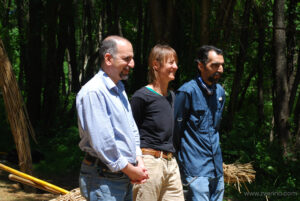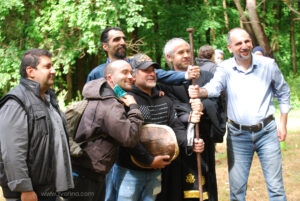
A house built of five crossing arches made of reeds spanned over knotted joists and lattices. Columns and walls strung together with rope and twine, encompassing a breezy and light-flooded space. A shelter in the middle of the woods at the Schuylkill Center. Upon entering, the reed structure offers a shady sitting area with carpets and pillows, inviting guests to gather and relax. Al Mudhif – A Confluence is the new art installation by Iraqi designer Yaroub Al-Obaidi and environmental artist Sarah Kavage in Philadelphia.
In the southern Iraqi marshlands, where it is utilized as a ceremonial space of welcome, a mudhif — Arabic for guesthouse — is traditionally made from top to bottom of the wetland reed called phragmites. There, the reed is socially and culturally essential — but in our latitude, it is considered an unfettered invader of our regional watershed since its importation in the 19th century from Europe and the Middle East. The building of the mudhif in Roxborough has put this ancient material into practical use.
This is not the first time that industrial designer Yaroub Al-Obaidi has applied a natural material, such as reed, wood or glass, to practical design. Back in Baghdad his first projects involved envisioning outdoor sitting units and later school bags in collaboration with Iraqi literary districts in order to engage and connect audiences through visual material.
At that time the physical material was his medium. “But when I came to the United States,” Al-Obaidi explains, “I found myself working with a different material: stories.” A creative shift that the artist sees manifested in the physical construction of the Iraqi guesthouse, Al Mudhif. For him, the house is not only a physical space made in the ancient tradition of Sumerian architecture, but also a symbol for building connections across communities and cultures.
The story of how an Iraqi designer ended up building a guesthouse from invasive reeds in Philadelphia is both long and interwoven with anxiety, restlessness and uncertainty, but also with empathy, generosity and optimism. A former lecturer on art and industrial design at the University of Baghdad, Al-Obaidi fled Iraq to Syria threatened by extremists in 2007, hoping to return home once the dust of war had settled. But with the continued loss of relatives in Iraq, he and his family realized that their future could only be elsewhere. While working in Malaysia in support of his family, Al-Obaidi along with his brothers and mother applied for refuge to the United Nations. A seemingly infinite number of interviews later, he resettled to Philadelphia as a refugee in 2016 where the family happens to have a distant relative, in the hope to find peace and work in their new home.

“So many people think that [being a] refugee is a choice,” Al-Obaidi says. “They don’t understand that I was forced to do that.” But when Al-Obaidi tells his story of grueling waiting, scrutinization and resettlement, people shift their perspective and start to understand: “I’m not here to take an opportunity,” he declares, “but I’m here to be a part of this community, to contribute through my knowledge, through my experience.”
And this is what Yaroub Al-Obaidi is hoping to achieve through building an Iraqi guesthouse at the Schuylkill Center. “Al Mudhif is a way of building bridges,” he shares his vision – bridges between places, people, and cultures. “And I want to build [these] bridges because this is the only way we can continue to live [together].” He believes that through the guesthouse he can bring a part of his culture to Philadelphia, contributing to the diversity of a city of immigrants and to the richness of indigenous traditions in the local watershed by connecting them to the unique traditions of the Mesopotamian Marshes. Al-Obaidi feels that contributing to diversity has been a literal request to him from the city and its citizens.
Encountering the rich history of Philadelphia has made him feel connected and encouraged him to share the stories from his own culture. Al Mudhif becomes the container for such stories. Al-Obaidi imagines the dialogs that it will spark: “Someone says, ‘Have you been to Roxborough?’ and the other says, ‘I have been to the Schuylkill Center … and I built Al Mudhif.’ ‘What is Al Mudhif’ ‘It is a gathering space.’” Thus, Al-Obaidi enthuses, “a wonderful story starts.”
The project is filled with love, he continues. His hope is that “thousands of Americans start to say Al Mudhif, and know what it [is], and that it is made out of reeds.” Although the guesthouse is reduced in scale and slightly modified from the traditional design, its symbolism as a place of sharing and belonging is much greater. The mudhif, Al-Obaidi believes, has the potential to reduce the gap between the two countries by bringing Iraqi knowledge and culture closer to Americans.
As a refugee and an artist, Yaroub Al-Obaidi sees the mudhif as an “iconic symbol” for rapprochement and belonging that can heal injuries between Iraqis and Americans – invaded and invaders – without resentment or idealism. The idea that healing starts with sharing is also the belief of Al-Obaidi’s artistic collaborator on this project, Sarah Kavage. Al Mudhif is part of her multi-sited art installation, Water Spirits, which features constructions made from natural materials such as phragmites throughout the Delaware River watershed. Through this collaborative work with an invasive plant material she hopes to heal people’s relationship to the natural environment and with each other.
Al Mudhif is the spatial and metaphorical vessel into which people are invited to share their stories and memories. Belonging and sense of home, so it is Al-Obaidi’s belief, are born out of human connections, and connections result out of curiosity.
By Tina Plokarz, Director of Environmental Art
